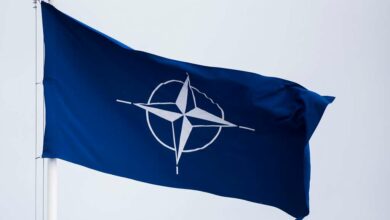KABUL, Afghanistan — "Shoulder to shoulder" is the mantra of the NATO-Afghan military partnership. Now, after Afghan soldiers and police turned their guns on their foreign partners during outrage over the Quran burnings, even Western advisers — not just combat troops — are looking over their shoulders.
The deepening distrust is jeopardizing the US-led coalition's strategy of training Afghan security forces and helping government workers so that international troops can go home.
The advisers do a variety of jobs. While some focus on the battlefield, others pore over geological surveys, lure outside investors or make sure that key mountain passes are clear of snow. They work closely with their Afghan counterparts to build a government strong enough to fend off threats and attacks from the Taliban and other militants trying to destabilize their country.
There has been lingering distrust for years. Afghan soldiers and police, or militants dressed in their uniforms, have shot and killed more than 75 US and other coalition forces in Afghanistan since 2007.
But tensions soared 25 February when two US military advisers were found dead with gunshots to the back of the head inside the Afghan Ministry of Interior, one of the most heavily guarded buildings in the capital, Kabul.
The two were among six US troops killed by Afghan security forces during a week of demonstrations over the burning of Islamic books and Qurans at a US military base in eastern Afghanistan. President Barack Obama and US military officials say the burnings were a mistake and not intentional.
Hours after the military advisers' bodies were found on the floor of their office, General John Allen, the top commander of US and NATO forces in Afghanistan, took the unprecedented step of recalling hundreds of coalition personnel working in more than two dozen government ministries in Kabul. He said the decision was made "for obvious force protection reasons." Britain, France, Germany and Canada quickly followed suit, putting much of the West's mentoring and advising work on hold.
"It's a declining relationship. It has been for years," said Martine van Bijlert, co-founder of the Afghan Analyst Network in Kabul. "You won't be able to fix that. The big question is 'Will it remain a workable relationship?' I think it's possible. It could settle down, but it won't fully settle down to the old level."
"These advisers are crucial, especially in the security sector when we're talking about transition," said Haroun Mir, director of Afghanistan's Center for Research and Policy Studies in Kabul. "Certainly the Afghan government can function without them, but if they don't return, it will take a toll on the financial situation of the government. Many of these projects financed by donors require the presence of these advisers."
Allen is determined to get the advisers back into the ministries as soon as possible — when he deems it is safe enough to do so, said US Army Lieutenant Colonel Jimmie Cummings, a coalition spokesperson. The coalition has not disclosed the total number of advisers who work in the ministries.
Their work has not completely stopped, he said.
"Though they are not physically standing beside them, the advisers are still in daily communication with their Afghan counterparts, as General Allen directed to keep the lines of communication open," Cummings said. "We are committed to our partnership with the government of Afghanistan. … Tens of thousands of Afghan and coalition troops continue to effectively work together on significant missions every day."
A few dozen advisers critical to the mission have trickled back to work, but with additional security, Cummings said.
A senior Western adviser who oversees advisers in several ministries said that when they go back they probably will be required to wear body armor and travel in groups with armed escorts. The adviser said they also might have to get permission to visit the ministries, reducing day-to-day contact with their Afghan partners.
Some advisers, such as the ones involved in the Afghanistan-Pakistan Hands program, will balk at increased security, the adviser said. The US established the program in September 2009 to create a team of military and civilian experts who could develop close working relationships with their Afghan and Pakistani counterparts.
Contractors who serve as advisers generally are not so eager to rush back to the ministries, and some told the adviser they are ready to head home.
The adviser and all others who spoke on condition of anonymity for this article did so because of increasing tensions in the NATO-Afghan relationship.
Restoring trust between Western advisers and their Afghan counterparts will be challenging.
"If an adviser gets killed and you're an adviser, it's going to be difficult," said Nadia Gerspacher, a senior program adviser for the United States Institute of Peace in Washington.
"Is it going to make people less trusting and feeling more insecure in the ministry? Probably," said Gerspacher, who has been in contact with advisers in Kabul since the killings.
An international security contractor said he could feel the tension when he visited an Interior Ministry office the day after the US advisers were killed. Usually Afghan police there greet him with "Salamou Aleikom," meaning "Peace be with you." This time, 14 or 15 armed policemen standing in a hallway outside the office were silent, he said. The policemen asked an interpreter whether the Western contractor was American or British. He and a colleague soon left.
An Afghan National Police general at the Interior Ministry said he felt ashamed by the killings and would welcome the advisers back.
They are the teachers for Afghanistan's new system of providing security and if they don't return, the work being done to reform the unprofessional and corrupt policemen will collapse, said the general. A lot of work has been suspended since the killings, the general said.
Another official at the Interior Ministry said the Western advisers' morale had been shattered.
When two Western advisers visited his unit a few days ago, he tried to break the tension. Jokingly, he shook his finger at them, smiled and said: "You've been absent for four or five days. Your pay will be docked." He said that he has developed strong bonds with a few of the Western advisers and will consider them good friends forever.
Some ministries aren't so dependent on the advisers, according to an official at the Finance Ministry. He said the advisers were badly needed three or four years ago, but that the ministry was now staffed with talented, well-trained Afghan employees who no longer need the 20 to 25 well-paid Westerners who currently work there. The ministry could hire five Afghans with the salary paid to one Westerner, he said.



